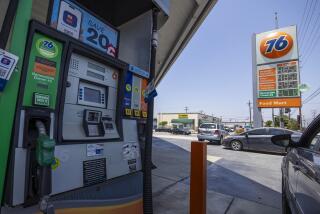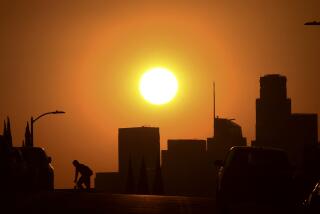Ban of Common Air Conditioners for Autos Sought
SACRAMENTO — As temperatures outside the Capitol soared toward 100, Assemblyman John Vasconcellos (D-Santa Clara) said Monday that he will introduce a bill to ban the sale of the most common kind of auto air conditioning units within two years.
He insists that Californians would be willing to sweat out their summers, if necessary, in the fight against the depletion of the ozone layer.
“Do you want to be hot, or dead?” Vasconcellos said from his air-conditioned office.
The measure is designed to reduce the amount of chlorofluorocarbons (CFCs) released into the atmosphere from auto, home and office air conditioners. It would ban the sale of cars with air conditioning in the state after Jan. 1, 1991, unless manufacturers come up with a less harmful cooling method. After 1992, the sale of building air conditioners that release chlorofluorocarbons would also be banned.
Scientists have said that CFCs are a major villain in the destruction of the ozone layer, which protects the Earth from harmful ultraviolet rays. Air conditioning emissions may make up as much as one quarter of all atmospheric CFCs, according to the Environmental Protection Agency.
Vasconcellos, chairman of the powerful Ways and Means Committee, was instrumental in the banning of CFCs in aerosol spray cans in the state 10 years ago.
Although his Oldsmobile is equipped with air conditioning, Vasconcellos said he refuses to use it. He said he does not use an artificial cooling system in his home.
Holes in the ozone layer have already been documented at the North and South poles, and there is growing evidence of a hole over the Equator, Vasconcellos said. People will see the benefits of sweat when the incidence of skin cancer begins to spiral upward, he said.
“The naivete of people who think they can’t live without (air conditioning) just baffles me. Folks did live without it once upon a time,” Vasconcellos said.
More to Read
Sign up for Essential California
The most important California stories and recommendations in your inbox every morning.
You may occasionally receive promotional content from the Los Angeles Times.










